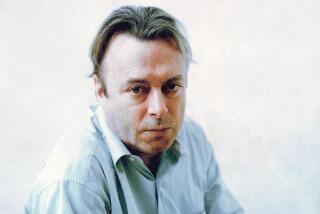Celebrating the genius of ‘Huckleberry Finn’
- Share via
Mark Twain was not quite 50 when he published “The Adventures of Huckleberry Finn” in February 1885, and in so doing, changed American literature. Until then, many of our writers had flirted with vernacular expression, most notably Thomas Paine, whose “Common Sense,” was written to appeal to (and to sway) the common man. To read Paine now, however, as well as other populists such as Thoreau and Whitman, is to confront a strange dichotomy between their democratic intentions and their elevated prose.
FOR THE RECORD:
A subheadline on an earlier online version of this article said the novel “Huckleberry Finn” turns 175 this year. As the article notes, it turns 125.
Not so with Twain, who with “Huckleberry Finn,” invented a new kind of American language. “All modern American literature comes from one book by Mark Twain called ‘Huckleberry Finn,’” Ernest Hemingway famously declared in 1935. “It’s the best book we’ve had. All American writing comes from that. There was nothing before. There has been nothing as good since.”
“Huckleberry Finn” turns 125 this year, which is also the 175th anniversary of Twain’s birth and the 100th of his death. It’s a perfect time to reconsider his importance, not because of these anniversaries but in spite of them. Such occasions, after all, often obscure our ability to engage with a writer; they become mausoleums built around the life and work. What does it mean to call “Huckleberry Finn” a great book, and Twain a quintessential American voice? Such praise means nothing if we can’t feel it, if we can’t get inside the language, the world view, if we can’t experience it as living literature, something that transcends its time.
For this reason, Norman Mailer chose, on the occasion of “Huckleberry Finn’s” centennial, to celebrate it as if it were a new book, transformative and fresh.
“The book was so up-to-date!” he wrote in the New York Times Book Review. “I was not reading a classic author so much as looking at a new work sent to me in galleys by a publisher. It was as if it had arrived with one of those rare letters which says, ‘We won’t make this claim often but do think we have an extraordinary first novel to send out.’ So it was like reading ‘From Here to Eternity’ in galleys, back in 1950, or ‘Lie Down in Darkness,’ ‘Catch-22,’ or ‘The World According to Garp.’”
“The World According to Garp”? That one’s a bit of a stretch, but Mailer’s point — like Hemingway’s — was that Twain’s great rolling river of a novel set the stage for everything that was to come. It’s not just the writing, although the decision to tell the story in the voice of a country boy enabled Twain to experiment with language in a way few works of fiction had before. “You don’t know about me without you have read a book by the name of ‘The Adventures of Tom Sawyer’; but that ain’t no matter,” he begins. “That book was made by Mr. Mark Twain, and he told the truth, mainly. There was things which he stretched, but mainly he told the truth.”
Here, we see the setup in a nutshell. This is a novel meant to be read as if it were a found document: a personal history, a bit of testimony. This is the first person point-of-view taking root in American literature, the voice of the outsider, cut adrift from all he thought he knew. This is the lost boy going on the road (or the river), living beyond the strictures of society, while in the service of a bigger truth.
“All right, then, I’ll go to hell,” Huck exclaims when he finally decides he’s not sending Jim back to slavery, and the choice is epic in its Americanness, its reckoning between public law and private conscience. “It was awful thoughts and awful words,” Huck continues, “but they was said. And I let them stay said; and never thought no more about reforming. I shoved the whole thing out of my head, and said I would take up wickedness again, which was in my line, being brung up to it, and the other warn’t. And for a starter I would go to work and steal Jim out of slavery again; and if I could think up anything worse, I would do that, too; because as long as I was in, and in for good, I might as well go the whole hog.”
This suggests another aspect of American culture that “Huckleberry Finn” effectively challenged: our tortured relationship with race. It’s one of the miracles of the novel that a white man, born and raised in slave territory, would come out so forcefully and subtly for the human rights of blacks. Jim is the moral center of the book, and in some sense became the progenitor of such works as “Pudd’nhead Wilson” (1894), praised by Langston Hughes for being “as contemporary as Little Rock, and Mark Twain as modern as Faulkner.” That’s a fine comparison, if only because without Twain, it’s hard to imagine what Faulkner’s fiction might have looked like, just as it’s impossible to consider the quiet power of a Faulknerian character like Dilsey (“They endured,” Faulkner wrote of her in his 1946 appendix to “The Sound and the Fury,” using the plural to imply not just the depth and breadth of her perseverance but also a sense of connection, of lineage) without the influence of Jim.
And yet, there is something of the accident in “Huckleberry Finn,” which is, in its own way, without antecedent, not only in American literature but also in Twain’s own body of work. Of the 20 or so books he published before its appearance, only a handful — “The Innocents Abroad,” “Roughing It,” “Life on the Mississippi,” “The Prince and the Pauper” — remain with us, as if the first quarter century of his career was more or less a prelude to “Huckleberry Finn.” (Even “The Adventures of Tom Sawyer” is slighter in comparison to Huck’s tale: It is a story for boys, of small-town life and the bogeyman, Injun Joe.) No, as Kurt Vonnegut once suggested about the creation of “Huckleberry Finn,” Twain simply “flabbergasted himself by writing a novel as comically profound as the masterpiece ‘Don Quixote’ … How the heck did he do that?”
How indeed? This remains an open question today, but isn’t that the way with all great art? Twain went on to write many more books, including the bleak and beautiful efforts of his final years, “The Mysterious Stranger” and “Letters From the Earth.” Still, “Huckleberry Finn” is the one that dominates, in Twain’s oeuvre and in all of American literature, the book that started it all. Here, we have the emergence of an American voice in all its idiomatic grace and power, the raw expression and the moral vision, brought together in the figure of this young boy.
“[S]o,” Huck tells us in the closing lines of the novel, “there ain’t nothing more to write about, and I am rotten glad of it, because if I’d a knowed what a trouble it was to make a book I wouldn’t a tackled it, and ain’t a-going to no more. But I reckon I got to light out for the Territory ahead of the rest, because Aunt Sally she’s going to adopt me and sivilize me, and I can’t stand it. I been there before.”
More to Read
The biggest entertainment stories
Get our big stories about Hollywood, film, television, music, arts, culture and more right in your inbox as soon as they publish.
You may occasionally receive promotional content from the Los Angeles Times.










